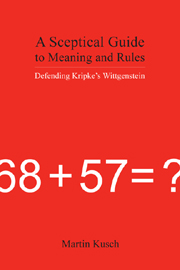Book contents
4 - Other responses
Summary
Introduction
Chapters 2 and 3 showed that reductive semantic dispositionalism is not a satisfactory answer to the sceptical challenge. Alas, to show that dispositionalism is not up to the task is not yet to establish that high-brow meaning determinism fails. After all, dispositionalism is not the only high-brow meaning-determinist response to the sceptic. In this chapter I therefore discuss four other meaning-determinist proposals:
(i) the simplicity response,
(ii) the algorithm response,
(iii) the causalist response, and
(iv) the Platonist response.
WRPL attacks versions of (i), (ii) and (iv). Critics of WRPL have sought to rebut these attacks either by finding fault with Kripke's specific arguments or by developing new versions of the mentioned positions. I shall seek to advance the discussion by demonstrating the insufficiency of both the fault-finding and the refinements.
By (iii), “causalist response”, I mean an answer to the sceptical challenge based on Kripke's and Putnam's causal theory of reference. Interestingly enough, Kripke never brings up the causal theory in WRPL. Some commentators have lamented this fact and championed the causal theory as (part of) a successful meaningdeterminist position. I remain unconvinced.
At the end of this chapter I shall have covered four of the seven high-brow meaning-determinist approaches distinguished in WRPL. The remaining three are the use response, the qualia response, and semantic primitivism. In Chapter 1, I outlined Kripke's Wittgenstein's criticism against all three.
Information
- Type
- Chapter
- Information
- A Sceptical Guide to Meaning and RulesDefending Kripke's Wittgenstein, pp. 127 - 147Publisher: Acumen PublishingPrint publication year: 2006
